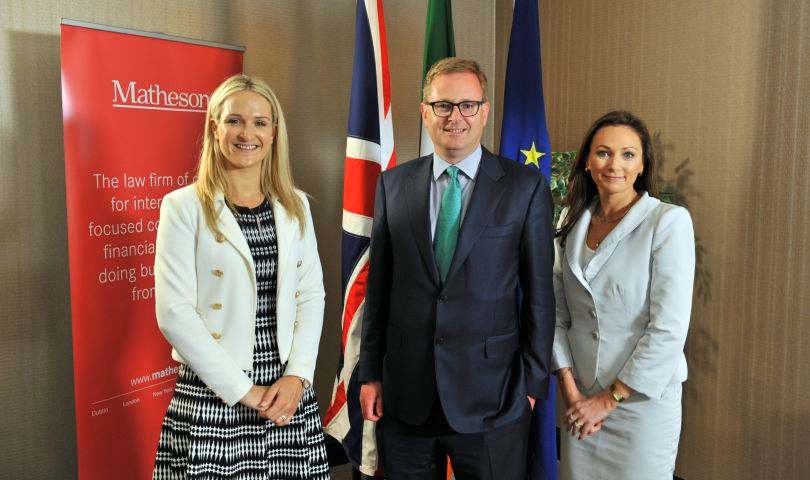A report on the impact of Brexit at the level of individual businesses has found that most concern centres on the free movement of goods and the possible imposition of tariffs on trade.
Other concerns felt widely include those relating to mutual recognition of standards and the free movement of people. The study highlights that a ‘no deal’ outcome of the negotiations would have serious implications for many aspects of a firm’s operations.
The report from the Department of Business, Enterprise and Innovation is based on a survey of 170 firms carried out last year by Deloitte.
The report, which goes into granular detail in respect of 15 different sectors of the economy, sets out five areas of serious concern for firms. The executive summary states: “In terms of the four freedoms afforded by membership of the EU, the fears about changes to the free movement of goods generate the highest level of concern across sectors, followed by reduced freedom to trade in services and an end to free movement of labour. Finally, firms expressed least concern about changes to the free movement of capital and the level playing field provided by the status quo.”
Quantifying the factors likely to have an impact, it continues:
“The possible imposition of tariffs on trade creates the greatest concern: Taken together, firms are most concerned about Brexit resulting in new tariffs on trade with the UK followed by the imposition of a physical border in Northern Ireland and then, the end of a shared common area with the UK (customs, fisheries etc.).
Tariff Concerns
“Firms in goods and services sectors rank Brexit concerns differently but with some areas common to both: Tariffs, borders, customs/common areas, mutual recognition and standards generate the greatest concern, in that order, in the goods sectors. Firms in the services sectors also cite possible tariffs as the area of most concern, followed by freedom to provide/receive services, borders, customs/common areas, and restrictions on the movement of people.
“There is variation between sectors as to the level of concern: Of the fifteen sectors analysed, the chemicals/pharmaceuticals sector expressed the highest levels of concern about the impact of Brexit on their business (although this results reflects the fact that the enterprises in this sector provided responses in respect of all 20 impact factors). Firms in the rental/leasing sector expresses the least aggregate concern about the potential impact of Brexit on firms. Such variation might be expected given the known different levels of exposure that individual sectors have to Brexit, while company scale may also be a factor.
“The level of concern about Brexit also varies significantly within sectors: Less expectedly, firms within the same sector demonstrate a wide variation in levels of concern about the potential for Brexit to harm their operations. This variation is explained by several factors which are detailed in the next section.
“Firms across sectors did not appear to be systematically taking action to mitigate the potential impact of Brexit: Only half of the fifteen sectors were active in this regard, undertaking scenario planning, investigating alternative sources of inputs, reviewing product mix, assessing legal entity status changes, and establishing UK companies. The other sectors reported few significant preparatory steps at this point.”
Sectors exhibiting high levels of concern include chemicals and pharmaceuticals, dairy, beverages, construction, energy, and financial services, with manufacturing, computer and electronic products, and meat around average and transport, computer consulting and management, programming, plus rental and leasing among the least concerned.
'Business Can't Wait'
Meanwhile at a Financial Times Brexit seminar in London, Michael Jackson, managing partner of law firm Matheson, said that businesses can’t afford to wait and need to plan for the increased prospect of a hard Brexit scenario.
According to Jackson: “While all parties still hope for a deal that accommodates all sides, the reality is that nine months out from the target date for a final deal is that businesses have to make Brexit planning choices and are making them now. They can’t wait for the political process to catch up with their business planning challenges.
“Matheson has seen a significant increase in Brexit matters that we are working on, and the sectors involved have broadened, particularly in the last six months. In the first year or so after the Brexit vote, financial services companies were to the fore in planning for a post Brexit landscape and started looking at Ireland as a base for new operations.
“However in the last six months we have seen an increase in new matters related to the pharma, food and tech sectors. Businesses can’t wait any longer, they are making the decisions now to Brexit proof their operations.”
Photo: Michael Jackson with colleague Liz Grace (right) and minister Helen McEntee. (Pic: Adrian Brooks/Imagewise)








